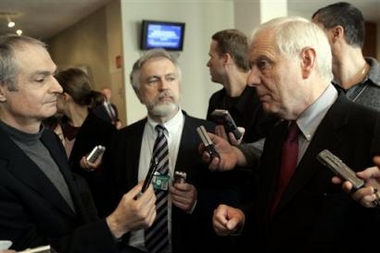Russia and China have rejected proposals from the United States and other
veto-wielding members of the UN Security Council for a statement demanding that
Iran clear up suspicions about its nuclear program, diplomats said Monday.
The dispute raises the threat of an impasse in the Security Council and
means that the US, Britain and France may not get their wish for strong action
by the powerful UN body. They believe such a text could further isolate Iran and
help compel it to abandon uranium enrichment, a process that can produce fuel
for a civilian nuclear reactor or fissile material for an atomic bomb.
Iran, meanwhile, sent more mixed signals about its intentions. Its president
said Iran's very existence depended on nuclear development, but Russia reported
that Iranian diplomats had asked for more consultations.

Emyr Jones Parry,
right, British Ambassador to United Nations spoke to reporters after he
left a Security Council consultations at UN Headquarters Monday, March 13,
2006. Britain and France, backed by the United States, have proposed that
the council demand Iran abandon uranium enrichment _ a process that can
produce fuel for a nuclear reactor or fissile material for an atomic bomb
_ and adhere to its obligations under the Nuclear Nonproliferation Treaty.
[AP] |
Only a day earlier, talks on Russia's Western-backed offer to host Iran's
uranium enrichment program collapsed when Tehran rejected Moscow's demand to
suspend enrichment activities at home.
"Contradictory signals are coming from Tehran," Russian Foreign Minister
Sergey Lavrov told reporters Monday of Iran's response to the proposal. "One day
they reject it, the other day they don't."
The board of the U.N. nuclear watchdog, the International Atomic Energy
Agency, voted last month to report Iran to the Security Council, saying it
lacked confidence in Tehran's nuclear intentions and accusing Iran of violating
the Nuclear Nonproliferation Treaty. Iran responded by ending voluntary
cooperation with the IAEA and announcing it would start uranium enrichment and
bar surprise inspections of its facilities.
IAEA chief Mohamed ElBaradei accused Iran of withholding information about
its nuclear program, possessing plans linked to nuclear weapons, and refusing to
freeze uranium enrichment.
In the last week, council diplomats have weighed how to respond. Ambassadors
from the five veto-wielding nations all said publicly that discussions continued
on several proposals, including one from the British and French that would urge
Iran to stop enriching uranium.
But a U.N. diplomat, speaking on condition of anonymity because of the
secrecy of the discussions, said Russia and China want the council to do one
thing only: acknowledge the primary role of the IAEA in handling the Iran issue.
The diplomat said that after three meetings, the Russians and Chinese showed
little indication they would change their positions. w At the heart of the
dispute is a difference in approach toward Iran, which insists its nuclear
program is meant only for peaceful purposes such as energy.
Russia and China, allies of Iran, believe council action — such as a
challenging statement or economic sanctions — risks angering Tehran further,
possibly causing the regime to withdraw from the Nuclear Nonproliferation Treaty
and kick out IAEA inspectors.
"I think that we want a constructive statement," China's Ambassador Wang
Guangya told The Associated Press on Monday morning. "I think they want to be
too tough."
In Iran, Foreign Ministry spokesman Hamid Reza Asefi indicated that his
government would wait for the outcome of the Security Council meeting to decide
whether to start enrichment on the scale required to provide fuel for its first
nuclear reactor at Bushehr, to go online later this year.
"It shouldn't come as any surprise to anybody that the Iranians would love to
talk further," U.S. Ambassador John Bolton said. "They've loved talking for the
last four years and they'll talk for as long as they can as they master the
technical difficulties they've encountered in the uranium enrichment process."
Finance Minister Davood Danesh-Jafari told reporters Monday that Iran could
survive any UN penalties.
"If sanctions are imposed, we are capable of managing the country according
to our past experiences. We could run the country with no dollars in oil revenue
as we did in the 1990s."
The United States and its allies could opt to bypass the Security Council
entirely in confronting Iran. Last week, US Undersecretary of State Nicholas
Burns said a coalition of countries supporting tough action might consider
targeted sanctions if the council was not firm enough.
The question now is whether Britain and France will push ahead with their bid
for a council statement.
Despite the disagreements, the two planned to circulate a draft text to the
entire 15-member council after the five permanent members hold another meeting
Tuesday, the UN diplomat said. They feel compelled to produce something partly
because the 10 other members of the council have grown irritated about being
shut out from the discussions.

